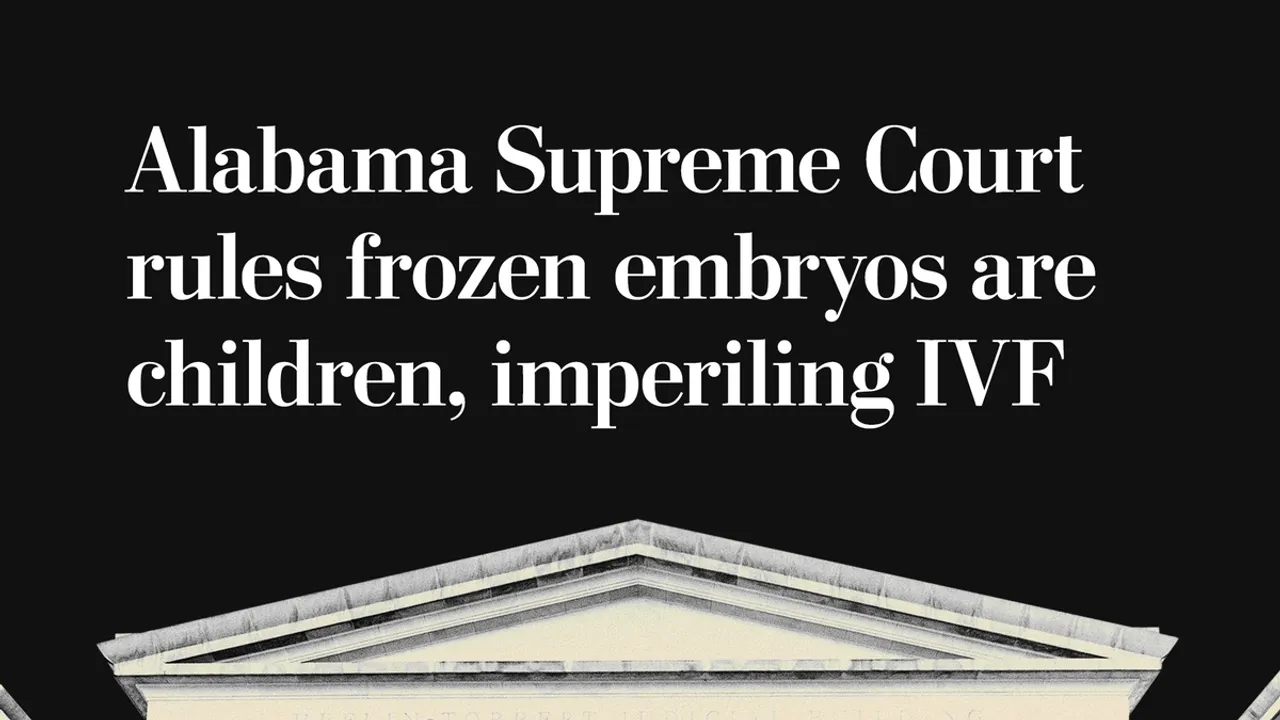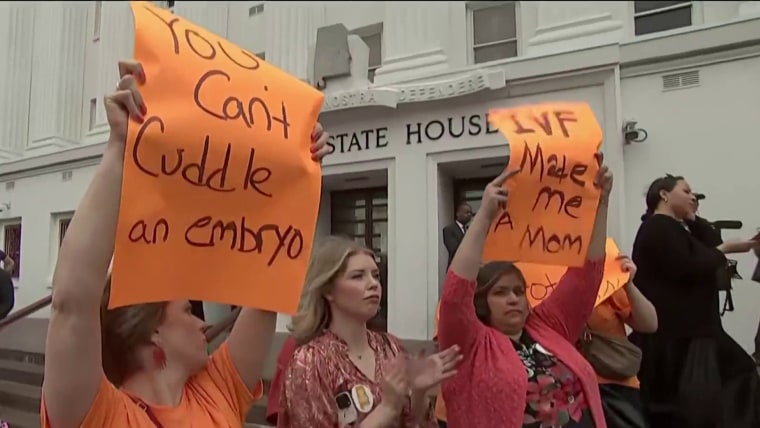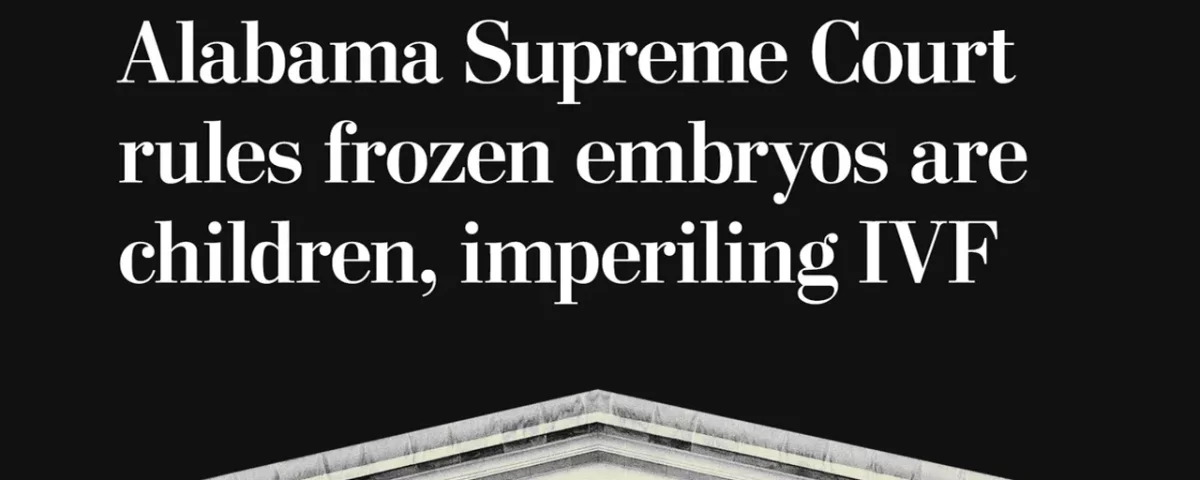
Everything You Need to Know About Buffalo Infertility and IVF
April 27, 2025Your Guide to Boston IVF Bedford, NH: Everything You Need to Know and More
April 27, 2025The Alabama Supreme Court IVF Ruling: What It Means for Families, Fertility, and the Future
Hey there! If you’ve heard whispers about the Alabama Supreme Court and IVF (that’s in vitro fertilization, aka the science that helps people have babies), you’re not alone. It’s a topic that’s been buzzing lately, and it’s way more than just legal jargon—it’s about real people, real dreams, and some pretty surprising twists. Imagine wanting to start a family, only to find out a court ruling might flip everything upside down. That’s what happened in Alabama in 2024, and it’s got folks across the country talking.
In this deep dive, we’re going to unpack the Alabama Supreme Court IVF ruling from February 16, 2024. We’ll explore what it means for hopeful parents, peek into the lives of the justices who made the call, and dig into details you won’t find in the headlines—like how this could change IVF forever. Plus, we’ve got practical tips, the latest research, and some secrets about the ruling that’ll make you say, “Wait, really?” Let’s jump in!
What Happened with the Alabama Supreme Court IVF Ruling?
In February 2024, the Alabama Supreme Court dropped a bombshell: they ruled that frozen embryos—those tiny clusters of cells created during IVF—are legally “children” under state law. This wasn’t just a random decision—it came from a case called LePage v. Mobile Infirmary Clinic, Inc., where three couples sued after their frozen embryos were accidentally destroyed. They wanted justice under Alabama’s Wrongful Death of a Minor Act, a law from 1872 that lets parents seek damages if their child dies due to negligence.
Here’s the backstory: In 2020, a patient wandered into a storage area at a fertility clinic in Mobile, Alabama, grabbed some embryos from a super-cold freezer (we’re talking liquid nitrogen cold, like -320°F!), and dropped them on the floor. The embryos didn’t survive, and the couples were devastated. They argued these weren’t just lab samples—they were their future kids. A lower court disagreed, saying embryos aren’t “people.” But the Alabama Supreme Court said, “Hold up, yes they are!” They pointed to the law’s wording and a 2018 state constitutional amendment that protects the “rights of unborn children.”
Why This Matters
This ruling didn’t ban IVF outright, but it sent shockwaves. Suddenly, clinics worried they could be sued—or worse, prosecuted—if an embryo got damaged. Three major Alabama IVF providers hit pause on treatments, leaving families in limbo. It’s not just a legal thing; it’s personal. About 1 in 6 couples struggle with infertility, and IVF is often their lifeline. Now, that lifeline feels shaky.
Who Are the People Behind the Ruling?
Let’s meet the folks who made this call—the Alabama Supreme Court justices. These aren’t just names on a page; they’re real people with quirks, passions, and beliefs that shaped this decision. Fans of court drama might love these tidbits!
Chief Justice Tom Parker: The Big Voice
Tom Parker, the guy leading the court, wrote a special opinion that’s got everyone talking. He’s 72, loves history, and isn’t shy about his faith. He quoted the Bible and said embryos have “the image of God.” Fun fact: Parker’s a bit of a legend in conservative circles—he once worked with Roy Moore, another famous Alabama judge known for mixing religion and law. When he’s not ruling, Parker enjoys digging into old legal texts. His take? Life starts at conception, no exceptions.
Justice Jay Mitchell: The Rule Writer
Justice Jay Mitchell penned the main opinion. He’s younger, in his 40s, and a family man with four kids. He’s big on hunting and fishing—think camo and quiet mornings by the lake. Mitchell argued the law’s clear: “unborn children” includes embryos, even frozen ones. He’s a stickler for details, which shows in his careful breakdown of the 1872 statute.
The Dissent: Justice Greg Cook
Not everyone agreed. Justice Greg Cook, a car enthusiast who’s been known to tinker with engines in his garage, said this was a stretch. He’s in his 60s and argued that back in 1872, no one imagined IVF. To him, calling embryos “children” under this old law doesn’t fit. His dissent was like a lone wolf howling against the pack.
What Fans Might Not Know
- Parker’s Playlist: Rumor has it he’s into classic gospel tunes—think hymns that echo his beliefs.
- Mitchell’s Soft Side: He’s a sucker for his kids’ soccer games, often spotted cheering from the sidelines.
- Cook’s Hobby: He once rebuilt a vintage Mustang—patience is his game, on and off the bench.
These personal vibes matter because they hint at why the court leaned this way. Faith, family, and tradition played a huge role.

How Did This Ruling Affect IVF in Alabama?
Picture this: You’re mid-IVF cycle, shots in your belly, hope in your heart—and then your clinic calls to say, “We’re stopping.” That’s what happened to people like Gabrielle Goidel, a real patient who spoke to The Guardian. She was prepping for egg retrieval when the ruling hit, and her plans screeched to a halt.
The Immediate Fallout
- Clinics Shut Down: Big players like the University of Alabama at Birmingham (UAB) and Alabama Fertility paused IVF. Why? Fear of lawsuits or criminal charges if an embryo didn’t make it.
- Families Freaked Out: Couples with frozen embryos wondered, “What now? Can we move them? Destroy them? Are we stuck?”
- Doctors in a Bind: Fertility specialists worried every step—freezing, thawing, testing—could land them in hot water.
The Fix: A New Law
Alabama lawmakers scrambled to respond. By March 2024, they passed a law giving IVF providers immunity from lawsuits or prosecution. Clinics reopened, but the vibe was still tense. The new law didn’t say embryos aren’t children—it just shielded doctors. That’s a Band-Aid, not a cure.
Real-Life Impact
Take Latorya Beasley, who shared her story with PBS NewsHour. She was a week from her embryo transfer when clinics closed. “My dreams of growing my family were stopped dead in their tracks,” she said. It’s not just her—about 2% of U.S. babies (nearly 100,000 a year) come from IVF, per the CDC. In Alabama, that lifeline got tangled up fast.
What’s the Science Saying About Embryos and IVF?
Let’s zoom in on the science—because this ruling isn’t just about feelings or laws; it’s about what’s happening in those petri dishes.
Embryos 101
An embryo is what you get when a sperm meets an egg. In IVF, this happens in a lab. After a few days, it’s a tiny ball of cells—about 100 of them—smaller than a pinhead. It’s not a baby yet; it needs to implant in a uterus to grow. Freezing them? That’s just hitting pause with liquid nitrogen.
IVF By the Numbers
- Success Rate: Only about 25% of IVF cycles lead to a live birth, says the CDC’s 2021 data.
- Embryo Loss: Most cycles create extra embryos. Some don’t survive thawing, others aren’t viable (like if they’ve got chromosomal issues).
- Storage Stats: Over 600,000 embryos are frozen in the U.S., per a 2020 Health and Human Services estimate. Some say it’s closer to a million.
What Experts Think
Dr. Mari Mitrani, a fertility expert from Gattaca Genomics, told CBS News, “This ruling threatens Alabamians’ rights to start a family.” She’s worried it could mess with how doctors pick the best embryos—usually, they test and toss the ones that won’t work. Now? That’s risky.
Research Spotlight: A 2023 study in Fertility and Sterility found 20% of women who’ve done IVF conceive naturally later. That’s a reminder: IVF isn’t the only path, but it’s a big one for many.
Why Is This Ruling Such a Big Deal Nationally?
This isn’t just an Alabama thing—it’s a spark that could light fires elsewhere. Here’s why.
The Post-Roe Ripple
Ever since the U.S. Supreme Court overturned Roe v. Wade in 2022 (the Dobbs case), states have been flexing on reproductive rules. Alabama’s IVF ruling is a cousin to that fight. If embryos are “children,” what’s next? Bans on tossing unused embryos? Rules in other states?
Personhood Laws
Eleven states have laws saying life starts at fertilization. Georgia even lets you claim fetuses as tax dependents! Alabama’s the first to slap “personhood” on frozen embryos, but others might follow. Imagine IVF clinics in Texas or Florida facing the same heat.
The Political Angle
Politicians jumped in fast. Donald Trump said he supports IVF, while Democrats like Kamala Harris warned of “chaos” post-Roe. It’s election fuel—abortion and IVF are hot buttons for 2024.
What Could Happen?
- More Lawsuits: Clinics nationwide might face wrongful death claims if embryos get damaged.
- IVF Costs Skyrocketing: Freezing and storing could get pricier if every embryo’s a legal “child.”
- State Hopping: Some patients are moving embryos to states like Colorado with looser rules.
Hidden Impacts: Stuff You Haven’t Heard About
Here’s where we get juicy—details that slipped through the cracks of most news stories.
The Emotional Toll
IVF’s already a rollercoaster—hormone shots, endless appointments, and hope mixed with heartbreak. Add legal drama? Oof. AshLeigh Meyer Dunham, a Birmingham mom who used IVF, told The Washington Post, “Women feel under attack and powerless.” It’s not just about law; it’s about dreams on hold.
The Money Problem
IVF isn’t cheap—$10,000 to $30,000 per cycle, says the American Society for Reproductive Medicine. If clinics can’t discard bad embryos (to avoid lawsuits), you might have to implant every single one, even the duds. That’s more cycles, more cash, more stress.
The Divorce Dilemma
What if you split up? Normally, couples decide who gets the embryos or if they’re destroyed. Now, in Alabama, could one partner sue to “save” them as “children”? It’s a legal mess waiting to happen.
A Religious Twist
Chief Justice Parker’s Bible quotes weren’t random. Alabama’s got a strong religious streak—64% of adults say religion’s “very important,” per Pew Research. This ruling’s got faith fingerprints all over it, which isn’t how most science-based IVF debates go.
Practical Tips for Navigating IVF After the Ruling
Worried about IVF in Alabama—or anywhere? Here’s how to stay smart and safe.
If You’re Starting IVF
✔️ Ask Questions: Call your clinic. Are they still freezing embryos? What’s their plan if laws tighten?
✔️ Look at Options: Some clinics in nearby states (like Tennessee or Georgia) might feel safer.
✔️ Budget Extra: Plan for higher costs if fewer embryos can be used per cycle.
❌ Don’t Panic: The immunity law helps for now—IVF’s still happening in Alabama.
❌ Don’t Skip Research: Know your state’s laws. Are embryos “people” there too?
If You’ve Got Frozen Embryos
- Check Storage Rules: Ask your clinic how they’re handling the ruling. Can you move embryos out of state?
- Get Legal Advice: A lawyer can clarify your rights—especially if you’re splitting with a partner.
- Plan Ahead: Decide now what you want—transfer, donate, or (if allowed) discard.
For Everyone
- Stay Updated: Laws are shifting. Follow groups like RESOLVE: The National Infertility Association for news.
- Talk It Out: Join IVF support groups online. Hearing from others helps.
What’s Next for IVF in Alabama and Beyond?
The future’s foggy, but here’s what might unfold.
In Alabama
- More Laws? The immunity law might get beefed up—or challenged. Some want embryos’ “personhood” clarified.
- Clinic Comeback: Most are back in action, but they’re watching every step.
Nationwide
- Domino Effect: If other states copy Alabama, IVF could get trickier in conservative spots.
- Federal Push: Senators are floating the Access to Family Building Act to protect IVF everywhere. Will it pass? TBD.
Latest Research Peek
A 2024 study from Johns Hopkins (published in Public Health On Call) suggests IVF restrictions could cut access for same-sex couples and older folks hardest. It’s not just about embryos—it’s about who gets to be a parent.
Dr. Joanne Rosen, a reproductive law expert, told the study team, “This decision is extraordinary because it’s the first to say frozen embryos are human beings.” That’s a game-changer.
Fun Facts to Wow Your Friends
Want to sound smart at the next hangout? Drop these:
- Embryo Adoption Exists: Over 7,000 babies have been born from donated embryos, says the National Embryo Donation Center.
- IVF’s Old School: The first IVF baby, Louise Brown, was born in 1978. She’s 46 now!
- Alabama’s Fertility Scene: The state has just five IVF clinics for 5 million people. Talk about pressure!

Let’s Talk About It
This ruling’s a lot to chew on. It’s about law, science, faith, and families—and it’s messy. What do you think? Should embryos be “children”? How would you feel if IVF got tougher where you live? Drop your thoughts below—I’d love to hear your take. Or, if you’ve got an IVF story, share it! Let’s keep this convo going.
